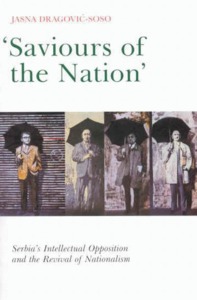'Saviours of the Nation': Serbia's Intellectual Opposition and the Revival of Nationalism
Dragovic-Soso, Jasna. 2002. 'Saviours of the Nation': Serbia's Intellectual Opposition and the Revival of Nationalism. London and Montreal: Hurst and Co and McGill-Queen's University Press. ISBN 1850655774 [Book]
![[img]](https://research.gold.ac.uk/1880/1.hassmallThumbnailVersion/dragovic_lg.gif)
|
Image (Details from 'Early March this Year with Friends' by Mica Popovic (1971))
dragovic_lg.gif - Cover Image Download (90kB) | Preview |
Abstract or Description
This text illustrates the elaboration of an anti-Yugoslav ideology, the transformation of dissident politics into a platform for Serbian "state" rights and the search for a programme on reforming the federation according to a narrowly defined Serbian national interest. The early 1980s saw the forging of a strong intellectual opposition movement in Serbia which contested the communist system and rallied around the defence of human and civil rights. By the end of the decade, this movement had become engulfed in the process of national homogenisation around Serbia's communist leader Slobodan Milosevic and his undemocratic approach to the resolution of the national question. The Belgrade intelligentsia's choice of nation over democracy and its de facto abdication of its critical role not only prevented it from representing a convincing alternative to Milosevic's belligerent and ultimately self-destructive policy, but also helped Serbia's neo-communist regime overcome its legitimacy crisis. This book examines this trajectory, highlighting both the limitations inherent in th early activism of critical intellectuals and their reactions to a context marked by deepening economic and political crisis, the disintegration of the common cultural sphere and the affirmation of other Yugoslav nationalisms. By focusing on three related areas - the revision of history and reassessment of the Titoist system, the opening of the "Kosovo Question" and the debates with Slovenian intellectuals - it illustrates the elaboration of a new anti-Yugoslav ideology centred around conspiracy theories and notions of victimisation and "genocide", the transformation of dissident politics into a platform for Serbian "state rights and the search for a programme on reforming the federation according to a narrowly defined Serbian national interest.
|
Item Type: |
Book |
| Departments, Centres and Research Units: |
|
| Date: |
October 2002 |
| Item ID: |
1880 |
| Date Deposited: |
12 Mar 2009 15:42 |
| Last Modified: |
30 Jun 2017 10:22 |
|
URI: |
View statistics for this item...
 |
Edit Record (login required) |

 Tools
Tools Tools
Tools
